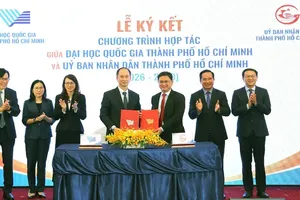
Accordingly, the objective for the city's educational progress until 2030, with a vision to 2045, is to construct a cutting-edge, contemporary, and globally integrated education system, becoming a distinguished hub for high-quality education and training in Vietnam and in Asia, ensuring a harmony between educational advancement and the quality of education.
Simultaneously, efforts will be directed towards building a learning-oriented society, fostering and facilitating fair conditions to encourage continuous education for all citizens and cultivate a skilled workforce capable of meeting the demands of economic, cultural, and social development, as well as international integration. By 2030, the education and training sector in Ho Chi Minh City aims to reach an advanced level within the Asian region, and by 2045, it aspires to attain global recognition for its advanced standards.
Specifically, by 2025, the goal is to reduce at least 10 percent in the average number of public non-business units and a 10 percent decrease in the payroll positions funded by the State budget compared to the figures in 2021. The city will cease contracts that do not adhere to regulations within public non-business units, with the exception of units ensuring financial autonomy.
Over the period leading up to 2025, direct expenditures from the State budget to public non-business units will be cut by an average of 10 percent compared to the 2016-2020 period.
By 2030, the city strives to guarantee that 60 percent of public preschools, 80 percent of public primary schools, 70 percent of public middle schools, and 50 percent of public high schools fulfill the national standards for infrastructure and classrooms.
In each district and Thu Duc City, at least two schools at each educational level will implement the high-quality program.
Furthermore, the city plans to have at least ten high schools, including specialized ones, equipped with modern infrastructure and high-quality teaching facilities that meet the standards for high-quality educational institutions. All schools within the city are committed to adopting the smart school model, and there are initiatives to construct four new high-quality multi-level schools in Thu Duc City, Binh Chanh District, and Cu Chi District.
To elevate the education quality, the city targets 100 percent of primary and 70 percent of secondary schools to implement two teaching sessions per day and at least 80 percent of high schools in each district and Thu Duc City to adopt the two-teaching-session per day model.
Specifically, 80 percent of high school students can communicate fluently and approach learning in a foreign language, equivalent to level 3 of the foreign language competency framework. All high school graduates are required to obtain basic information technology skills, with 50 percent of students meeting international standards in computer literacy.
Each high school student is expected to be proficient in playing at least one art form or musical instrument and engage in regular practice in at least one sport.
Concerning the teaching workforce, the city is set to enact policies to attract skilled professionals and highly competent individuals to join public non-business units. The city aims to establish a professional, clean, dedicated, dynamic, and innovative team of officials and staff who possess a mindset for innovation and a strategic vision.
In detail, all preschool teachers are required to hold at least a college-level pedagogical degree, with over 85 percent possessing a bachelor's degree in preschool education. For primary, secondary, and high school teachers, a minimum of a bachelor's degree in education (or equivalent) is mandatory for 100 percent of educators, and 40 percent of high school teachers should have a master's degree in their specialized field.
In terms of computer proficiency and foreign language skills, the city is committed to providing training and skill enhancement for 100 percent of management officials, teachers, and staff, covering basic to advanced digital competencies. Moreover, 80 percent of teachers is expected to meet level 2 standards in digital competency, aligning with the objectives of digital transformation. Additionally, 60 percent of teachers will be adept at communication and have the ability to access learning materials in a foreign language, corresponding to level 3 of the foreign language competency framework.
As for the vision to 2045, 20 percent of public preschools is expected to ensure conditions for autonomy. Among them, 10 percent will implement the high-quality educational program, and 80 percent of public preschools are expected to meet national standards.
Simimarly, in the realm of vocational education, the city aims to meet the demand for a highly skilled workforce by 2045. It envisions becoming a leading region in vocational education within the country and the ASEAN region and keeping pace with the world's advanced standards, possessing outstanding competitive capabilities in some training fields and industries.
























